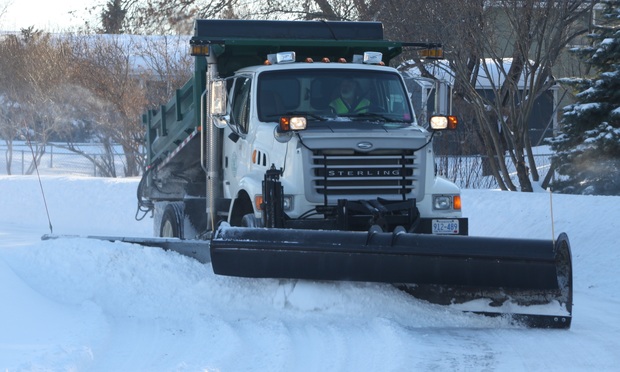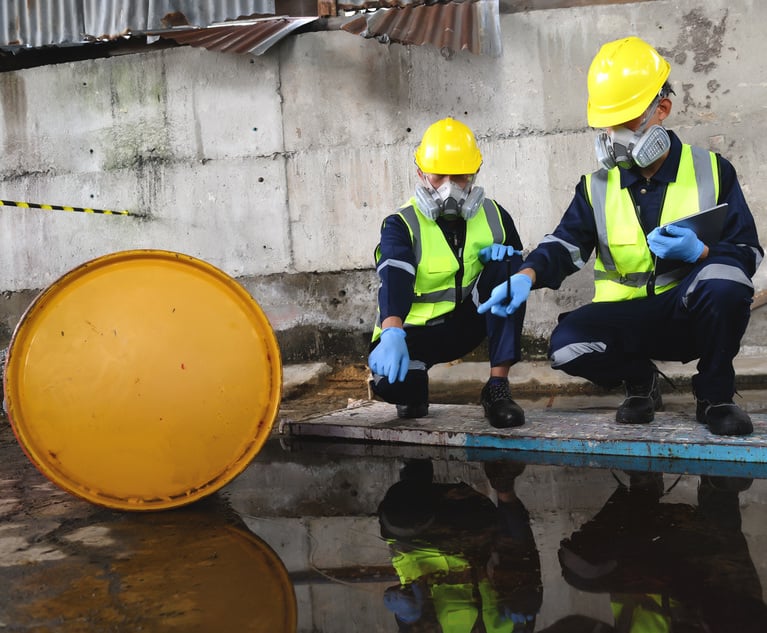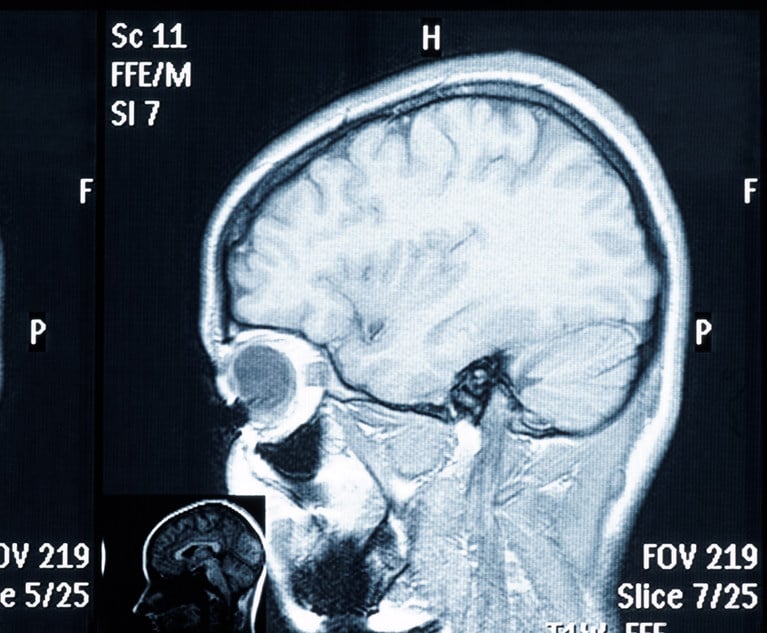Premises Liability Questions Require Legislative Action
General principles of public policy remain with respect to issues affecting the health and safety of the public, which should not be left to case law development on an ad hoc basis.
February 09, 2020 at 10:00 AM
5 minute read
 snowplow
snowplow
In Shields v Ramslee Motors, decided by the New Jersey Supreme Court on Jan. 23, plaintiff slipped and fell on ice on the driveway of commercial property in Jersey City. Under the lease to the tenant, Ramslee Motors, a used car dealership, Ramslee was responsible for maintaining the premises as if it were "de facto owner." The lease provided, among other things, that "during TENANT'S use and occupancy of the premises that TENANT shall be solely responsible for the maintenance and repair of the land and any structure placed on the premises at any time and from time to time during the lease, as if Tenant were the de facto owner of the leased premises." The landlord reserved the right to enter the premises for specified purposes, including "at any time in the event of emergency" and "at all reasonable hours, for the purpose … making such repairs or alterations therein as may be necessary for the safety and preservation thereof." That covenant was expressly stated not "to create an obligation on the part of the LANDLORD to make such inspection or repairs."
After plaintiff settled with the tenant, who had caused the driveway to be cleaned the day before the accident, the landlord obtained summary judgment. The Appellate Division reversed, holding that the lease was silent as to responsibility for snow and removal; that there was no distinction between the duty of the owner of commercial property to clean a sidewalk and to clean "an open driveway used with regularity;" and that the landlord had a non-delegable duty to "ensure that the driveway abutting the driveway was clear of snow and ice."
The Supreme Court reversed. It found that the lease clearly placed responsibility for maintenance of the property, including snow and ice removal, upon the tenant. It stated the term "maintenance" of the premises "includes the responsibility to remove snow and ice based on the plain meaning of that term." Further, there is a legal distinction between the right to enter the premises and the covenant to make repairs. Independently, the court held that the duty to clean a driveway "does not apply to private property," here the driveway was separated from the sidewalk by a gate which had to be opened for access, and the landlord did not retain control over the premises. The court concluded that the tenant "controlled the driveway where the plaintiff fell based both on relevant provisions in the lease" relating to the tenant's sole responsibility to maintain the property which Ramslee Motors had exercised, "and on the physical characteristics of the property." The court rejected the factors in Hopkins v Fox & Lazo Realtors, 132 NJ 436 (1993), where a plaintiff was injured while being shown a home for sale by a broker, as requiring the application of a non-delegable duty to maintain the premises.
Justice Albin concurred in the result and dissented in part. He agreed with the majority that, based on the record on the landlord's motion for summary judgment, there was "no common law duty to clear the commercial tenant's driveway of the transient condition of ice and snow." "[T]he landlord had no practicable way to know that the tenant would not clear the driveway in a timely way and therefore no reasonable opportunity to remedy the situation." But Justice Albin believes the "landlord has a duty to make reasonable efforts to repair a dangerous condition on the property that it knows or should know places at risk the lives and safety of people visiting or frequenting the premises." The landlord did maintain the right to enter to make repairs, profits from the lease and maintains sufficient control "to ensure the safety of the public." In essence, imposing the "common law duty on the landlord is both fair and in accord with public policy." Stated differently, the dissent disagreed with the "seeming pronouncement that absolves the landlord of the duty to make reasonable efforts to repair a dangerous condition on the property when the landlord knows or should know of the danger, when the landlord retains authority to remove the danger, and when the tenant fails to make the necessary repairs and the lives and safety of people are imperiled by negligent inaction."
We can debate the meaning of the lease regarding the landlord's right to enter the premises to make repairs and maintain the premises and its relation to removal of ice and snow, and whether this case presents the issue of concern to Justice Albin, as even he recognized by concurring in the result. We can hardly argue about the result in this case by virtue of the "de facto owner" clause and the record, but the court's split on an opinion of such public importance leads us again to urge the Legislature to examine the questions of sidewalk and premise liability by commercial and non-commercial landowners and tenants. Certainly, leases may contain significant if not controlling language, but some general principles of public policy remain with respect to issues affecting the health and safety of the public, which should not be left to case law development on an ad hoc basis.
This content has been archived. It is available through our partners, LexisNexis® and Bloomberg Law.
To view this content, please continue to their sites.
Not a Lexis Subscriber?
Subscribe Now
Not a Bloomberg Law Subscriber?
Subscribe Now
NOT FOR REPRINT
© 2025 ALM Global, LLC, All Rights Reserved. Request academic re-use from www.copyright.com. All other uses, submit a request to [email protected]. For more information visit Asset & Logo Licensing.
You Might Like
View All
The End of Innocence? DEP’s End Run Around ‘All Appropriate Inquiry’ Spill Act Protections
10 minute read

Trending Stories
- 1States Accuse Trump of Thwarting Court's Funding Restoration Order
- 2Microsoft Becomes Latest Tech Company to Face Claims of Stealing Marketing Commissions From Influencers
- 3Coral Gables Attorney Busted for Stalking Lawyer
- 4Trump's DOJ Delays Releasing Jan. 6 FBI Agents List Under Consent Order
- 5Securities Report Says That 2024 Settlements Passed a Total of $5.2B
Who Got The Work
J. Brugh Lower of Gibbons has entered an appearance for industrial equipment supplier Devco Corporation in a pending trademark infringement lawsuit. The suit, accusing the defendant of selling knock-off Graco products, was filed Dec. 18 in New Jersey District Court by Rivkin Radler on behalf of Graco Inc. and Graco Minnesota. The case, assigned to U.S. District Judge Zahid N. Quraishi, is 3:24-cv-11294, Graco Inc. et al v. Devco Corporation.
Who Got The Work
Rebecca Maller-Stein and Kent A. Yalowitz of Arnold & Porter Kaye Scholer have entered their appearances for Hanaco Venture Capital and its executives, Lior Prosor and David Frankel, in a pending securities lawsuit. The action, filed on Dec. 24 in New York Southern District Court by Zell, Aron & Co. on behalf of Goldeneye Advisors, accuses the defendants of negligently and fraudulently managing the plaintiff's $1 million investment. The case, assigned to U.S. District Judge Vernon S. Broderick, is 1:24-cv-09918, Goldeneye Advisors, LLC v. Hanaco Venture Capital, Ltd. et al.
Who Got The Work
Attorneys from A&O Shearman has stepped in as defense counsel for Toronto-Dominion Bank and other defendants in a pending securities class action. The suit, filed Dec. 11 in New York Southern District Court by Bleichmar Fonti & Auld, accuses the defendants of concealing the bank's 'pervasive' deficiencies in regards to its compliance with the Bank Secrecy Act and the quality of its anti-money laundering controls. The case, assigned to U.S. District Judge Arun Subramanian, is 1:24-cv-09445, Gonzalez v. The Toronto-Dominion Bank et al.
Who Got The Work
Crown Castle International, a Pennsylvania company providing shared communications infrastructure, has turned to Luke D. Wolf of Gordon Rees Scully Mansukhani to fend off a pending breach-of-contract lawsuit. The court action, filed Nov. 25 in Michigan Eastern District Court by Hooper Hathaway PC on behalf of The Town Residences LLC, accuses Crown Castle of failing to transfer approximately $30,000 in utility payments from T-Mobile in breach of a roof-top lease and assignment agreement. The case, assigned to U.S. District Judge Susan K. Declercq, is 2:24-cv-13131, The Town Residences LLC v. T-Mobile US, Inc. et al.
Who Got The Work
Wilfred P. Coronato and Daniel M. Schwartz of McCarter & English have stepped in as defense counsel to Electrolux Home Products Inc. in a pending product liability lawsuit. The court action, filed Nov. 26 in New York Eastern District Court by Poulos Lopiccolo PC and Nagel Rice LLP on behalf of David Stern, alleges that the defendant's refrigerators’ drawers and shelving repeatedly break and fall apart within months after purchase. The case, assigned to U.S. District Judge Joan M. Azrack, is 2:24-cv-08204, Stern v. Electrolux Home Products, Inc.
Featured Firms
Law Offices of Gary Martin Hays & Associates, P.C.
(470) 294-1674
Law Offices of Mark E. Salomone
(857) 444-6468
Smith & Hassler
(713) 739-1250







